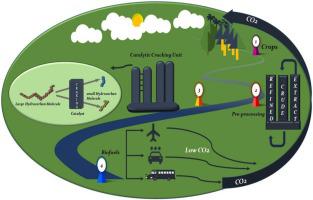Process Biochemistry ( IF 4.4 ) Pub Date : 2021-06-29 , DOI: 10.1016/j.procbio.2021.06.020 Samah Zaki Naji , Ching Thian Tye , Ammar Ali Abd

|
Bioenergy generated from vegetable oils is an interesting alternative energy source to fossil fuel in terms of reducing carbon footprint and realizing circular economy. Among many routes in transforming vegetable oils into biofuels, the catalytic cracking route is a promising method due to its capability to process a wide variety of feedstocks and its ability to produce a wide range of fuels. This paper aims to give a comprehensive overview of the state-of-the-art catalytic cracking technology in vegetable oils upgrading and provide a solid foundation to design a high-quality biofuel production system. This review covers the physical and chemical properties of various types of vegetable oils, the recent development of catalytic cracking mechanism of vegetable oils, especially the reaction pathways of the primary fatty acid constituents in most of the vegetable oils, the associated catalyst characteristics and the properties of the final products. Lastly, catalytic cracking of vegetable oils using the conventional fluidized catalytic cracking unit has also included.
中文翻译:

使用催化裂化技术将植物油转化为生物燃料的最新进展:近期趋势和未来展望
就减少碳足迹和实现循环经济而言,由植物油产生的生物能源是化石燃料的一种有趣的替代能源。在将植物油转化为生物燃料的众多路线中,催化裂化路线是一种很有前景的方法,因为它能够处理多种原料并能够生产多种燃料。本文旨在全面概述最先进的植物油升级催化裂化技术,为设计高质量的生物燃料生产系统提供坚实的基础。本综述涵盖了各类植物油的理化性质、植物油催化裂化机理的最新进展、尤其是大多数植物油中主要脂肪酸成分的反应途径、相关的催化剂特性和最终产品的特性。最后,还包括使用传统流化催化裂化装置催化裂化植物油。



























 京公网安备 11010802027423号
京公网安备 11010802027423号